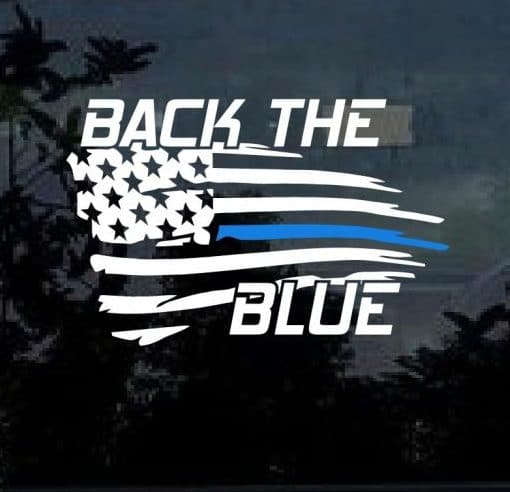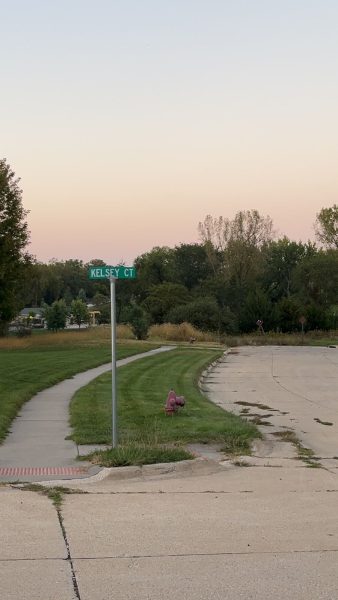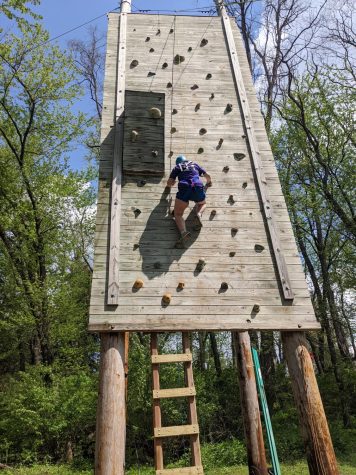Back the Blue?
Will this bill harm or help Iowa’s community?

Courtesy of Custom Sticker Shop
Back the blue symbol that’s used by people to demonstrate their support for local law enforcement.
On May 20, the Iowa Senate passed a controversial “Back the Blue” bill onto Gov. Kim Reynolds. In theory, this bill would add more protections for law enforcement without infringing on citizens’ First Amendment right to free speech. If passed, some of the protections for law enforcement officers would include the inability to civilly sue officers if they are operating under law, the inability for counties and cities to have official policies on their books saying that law enforcement cannot enforce certain parts of the law (if not followed, the city or county could lose their funding), and the outlawing of citing the Brady List as a reason to fire an officer.
The Brady List is a list of police employees whose involvement in a case undermines its integrity.
It would also protect drivers that hit protesters gathered in the street or on a sidewalk as long as they are exercising “due care,” which would mean any driving deemed non-reckless. Since there is no definite definition of “due care” this could lead to misinterpretation.This part of the bill is a direct response to Black Lives Matter (BLM) protesters making their way to I-80 multiple times last summer.
Jared Klein, Rep. of Washington County, supports this bill.
“I’ve got no problem with peaceful protests. Those are great and wonderful things, but when they turn violent that’s a whole different ball game, so we’re going to up the penalties on rioting and violence,” Klein said. “Those penalties will be hopefully severe enough to help deter any future problems like that because what we see when they march on the highways, those are dangerous situations for everybody involved.”
Supporters of this bill say that if passed, the protections this law would provide would encourage more officers to come to Iowa to work through benefits like sick leave insurance programs and qualified immunity, but critics claim it is a “slap in the face” to social activists.
“The legislature promised to do something about social justice and criminal justice and instead we see this policing bill that’s really a slap in the face, that goes against all those principles that instead, keeps penalties upon protesters, on people who are trying to speak out against social justice and then also gives police broad new powers with less accountability,” The Iowa Division of the American Civil Liberties Union criticized.
“I believe that politicians need to really check their motives. Why are we sending some of these things to the Senate? It just makes no sense. There are ulterior motives in some of this… and that’s why you have some people upset,” said another opposer.
Despite this, Klein claims this bill wouldn’t give officers less accountability, even under the outlawing of firing officers for being on the Brady List.
“Some people think we’re giving them a pass. Absolutely not,” Klein said. “All we’re saying is the list test to be known and the reason for being on the list test to be known, but the underlying offense is absolutely a fireable offense. Not protecting anybody who is stealing or tampering with evidence, those are all fireable offenses as well.”
The most disturbing part of this bill to people opposed is the feeling of their First Amendment rights being infringed upon. Upping the penalty for rioting (which is subjective in itself) to a felony would take away voting rights and convict you to up to five years in prison. The penalty for engaging in “unlawful assembly”
is upped from a simple misdemeanor to an aggravated misdemeanor. Blocking a sidewalk, highway, or any other public way could result in a serious misdemeanor.
Christina Bohanna, State Rep. House District 85 and University of Iowa Law Professor, and Janice Weiner, Iowa City City Councillor, wrote their opinion on this bill.
“Many parts of the ‘Back the Blue’ bill are extreme and unnecessary. Existing state laws are more than adequate to deal with protests. By ramping up penalties for vaguely defined crimes, this bill is likely to chill First Amendment rights of free speech and assembly. It also subjects young people and others to serious harm, and it prevents law enforcement from exercising critical discretion on how best to respond to fluid, quickly moving, and potentially dangerous situations. A bill supposedly about law and order will ultimately deprive us of our rights under law and make our communities less safe,” they said.
DISCLAIMER: Many people and persons of color were given an opportunity to speak on this topic but none wanted to go on the record with their opinion.

Laney Prelle, sophomore, is a second year staff member for the Live Wire.. At Liberty, she is involved in journalism and plays basketball. She spends most...












